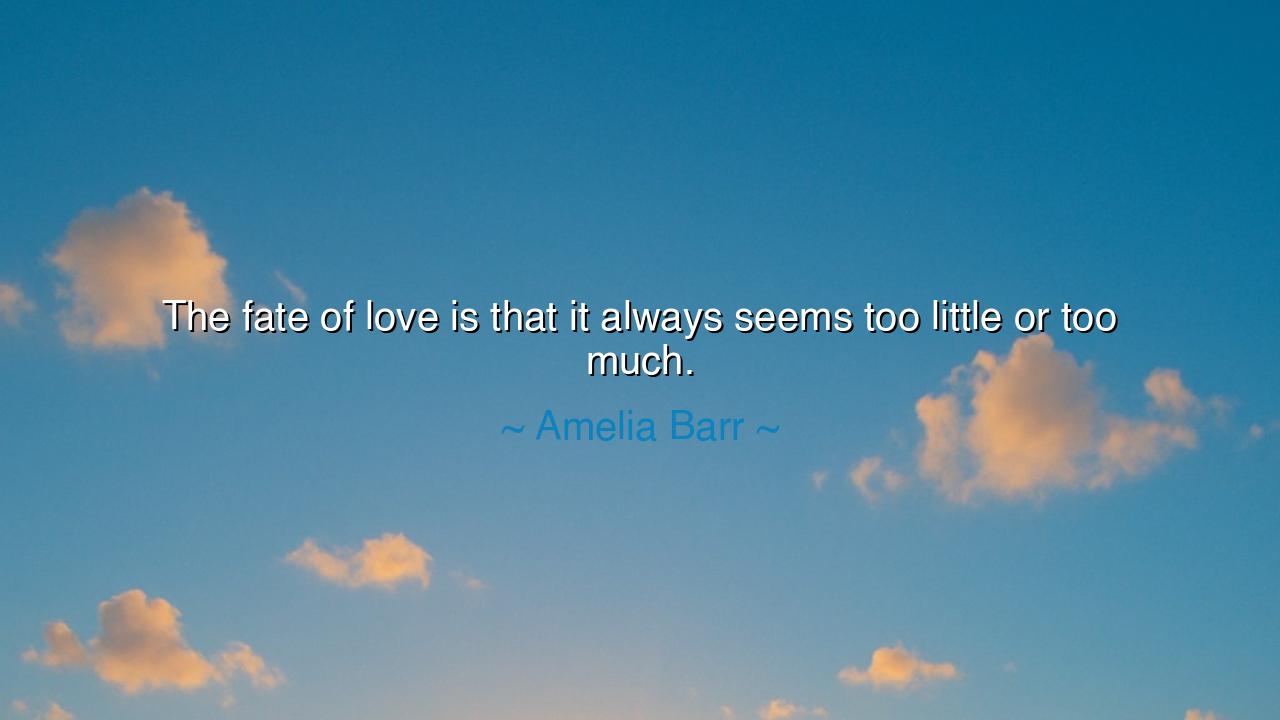
The fate of love is that it always seems too little or too much.






"The fate of love is that it always seems too little or too much." – Amelia Barr
From the pen of Amelia Barr, a woman of wisdom and sorrow who lived through storms both of the heart and the world, comes this quiet and piercing truth. Love, she tells us, is a force that rarely rests in balance. It is the fate of love to dwell in extremes — to overflow or to run dry, to burn too brightly or flicker too faintly. And in that very imbalance lies its beauty, its pain, and its mystery. For love is not a calm river, but a restless sea — ever shifting, ever deep, never still.
The ancients would have understood her words well. They knew that love is not a measured thing. The heart, once stirred, does not know moderation. To love “just enough” is to deny its nature, for love either surrenders wholly or withdraws in silence. Thus, the fate of love is tragedy and triumph intertwined — it asks for all that we are, yet can never quite satisfy all that we crave. When we love, we feel that we give too much and receive too little; when we are loved, we fear we cannot return it in equal measure. In this imbalance, we taste both heaven and heartbreak.
Consider the tale of Romeo and Juliet, those eternal lovers who defied their world for a love that consumed them. To them, every glance was eternity, every hour apart an agony. Their passion was not balanced, nor could it be — it was too much, and yet to them, it was never enough. Their story endures not because it was perfect, but because it captured this fate of love: that when the heart gives itself entirely, the mortal vessel can barely contain its fire. So it spills into tragedy, yet leaves behind a light that never dies.
And yet, the same truth haunts quieter loves as well. How many souls have watched affection fade slowly, drop by drop, until it feels too little to survive? How many lovers have longed for a word, a glance, a gesture — something to prove that the flame still lives — only to find the embers growing cold? Love, like the seasons, has its winters, when what once burned fiercely now barely glows. But even then, that small warmth can be sacred, for it reminds us that what once lived deeply still leaves a mark upon the soul.
Amelia Barr, who endured poverty, loss, and the death of her husband and children, wrote of love not as fantasy but as endurance. She saw that love’s imperfection is its truth. To expect it to be constant in measure is to misunderstand the human heart. We love with moods, with memory, with fear, and with hope — never the same way twice. Thus, the fate of love is not to be measured in its steadiness, but in its sincerity. Even love that feels “too much” or “too little” still carries the divine pulse of connection, still teaches us what it means to be alive.
There is a kind of wisdom in accepting love’s uneven rhythm. The ancients said that to love is to walk the edge between joy and sorrow — and that is why it is sacred. Do not curse love for being overwhelming, nor despair when it feels faint. Instead, see both as part of its eternal dance. When love floods your heart, let it teach you generosity; when it feels scarce, let it teach you patience and gratitude. For both are lessons that shape the soul toward greater understanding.
And so, my children of the living flame, remember this: The fate of love is that it always seems too little or too much, but this is no tragedy. It is the proof that love is alive. A love that is perfectly balanced is no longer love, but a shadow of it — safe, dull, unmoving. Real love trembles, yearns, and struggles; it reaches beyond reason and falls short of perfection. Cherish it in all its forms, whether it floods your world or flickers like a candle in the wind.
For in the end, the heart that dares to love — even imperfectly, even painfully — lives more deeply than the one that fears to love at all. Let love, whether too little or too much, be your teacher, your mirror, and your fire. For though its measure may change, its essence never does: to love is to touch eternity, and to be forever changed by its light.






AAdministratorAdministrator
Welcome, honored guests. Please leave a comment, we will respond soon